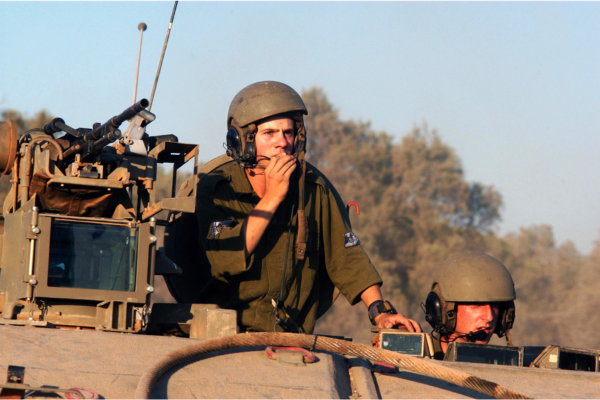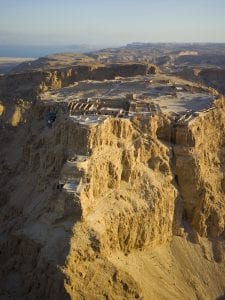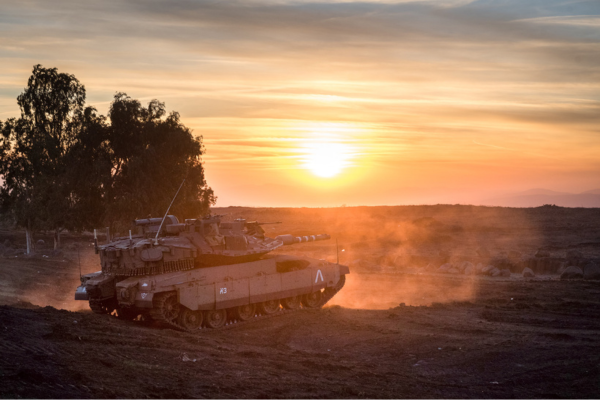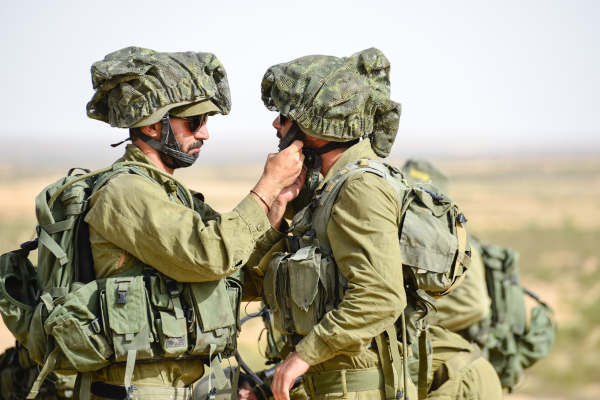
TORAH
NEVI'IM
KETUVIM
I - Chapter 31
Translation and Transliteration of
Listen to this chapter in Hebrew:
- Commentary
- Buy E-book
- Buy the Israel Bible
1The Philistines attacked Yisrael, and the men of Yisrael fled before the Philistines and [many] fell on Mount Gilboa.
אוּפְלִשְׁתִּים נִלְחָמִים בְּיִשְׂרָאֵל וַיָּנֻסוּ אַנְשֵׁי יִשְׂרָאֵל מִפְּנֵי פְלִשְׁתִּים וַיִּפְּלוּ חֲלָלִים בְּהַר הַגִּלְבֹּעַ׃
2The Philistines pursued Shaul and his sons, and the Philistines struck down Yehonatan, Avinadav, and Malchishua, sons of Shaul.
בוַיַּדְבְּקוּ פְלִשְׁתִּים אֶת־שָׁאוּל וְאֶת־בָּנָיו וַיַּכּוּ פְלִשְׁתִּים אֶת־יְהוֹנָתָן וְאֶת־אֲבִינָדָב וְאֶת־מַלְכִּי־שׁוּעַ בְּנֵי שָׁאוּל׃
3The battle raged around Shaul, and some of the archers hit him, and he was severely wounded by the archers.
גוַתִּכְבַּד הַמִּלְחָמָה אֶל־שָׁאוּל וַיִּמְצָאֻהוּ הַמּוֹרִים אֲנָשִׁים בַּקָּשֶׁת וַיָּחֶל מְאֹד מֵהַמּוֹרִים׃
4Shaul said to his arms-bearer, “Draw your sword and run me through, so that the uncircumcised may not run me through and make sport of me.” But his arms-bearer, in his great awe, refused; whereupon Shaul grasped the sword and fell upon it.
va-YO-mer sha-UL l'-no-SAY khay-LAV sh'-LOF khar-b'-KHA v'-dok-RAY-nee VAH pen ya-VO-u ha-a-ray-LEEM ha-AY-leh u-d'-ka-RU-nee v'-hit-a-l'-lu VEE v'-LO a-VAH no-SAY khay-LAV KEE ya-RAY m'-OD va-yi-KAKH sha-UL et ha-KHE-rev va-yi-POL a-LE-ha
דוַיֹּאמֶר שָׁאוּל לְנֹשֵׂא כֵלָיו שְׁלֹף חַרְבְּךָ וְדָקְרֵנִי בָהּ פֶּן־יָבוֹאוּ הָעֲרֵלִים הָאֵלֶּה וּדְקָרֻנִי וְהִתְעַלְּלוּ־בִי וְלֹא אָבָה נֹשֵׂא כֵלָיו כִּי יָרֵא מְאֹד וַיִּקַּח שָׁאוּל אֶת־הַחֶרֶב וַיִּפֹּל עָלֶיהָ׃
![]() 31:4 Whereupon Shaul grasped the sword and fell upon it
31:4 Whereupon Shaul grasped the sword and fell upon it

Masada fortress in the Judean Desert
Normally, suicide is absolutely forbidden in Jewish law. However, there are rare exceptions. The Sages teach that King Shaul’s death is even greater than his life. Though he knows it will lead to his death, he and Yehonatan lead the army into battle. Rather than allow himself to be captured and killed, he falls on his sword, as he is well aware that the capture of a king of Israel would bring despair to the entire nation. Thus, Jewish law views King Shaul as a prime example of self-sacrifice, as he sanctifies the name of Hashem and the People of Israel through his death. True leaders know that they don’t represent themselves alone; they represent the entire nation, and are therefore willing to make the necessary sacrifices. While Shaul’s death serves in Jewish law as the model of a rare acceptable form of suicide, the most famous such act in Jewish history took place on the mountain of Masada. According to Josephus Flavius in The Jewish War, the 960 Jewish inhabitants of the fortress on Masada, the last Jewish stronghold against the Romans after the destruction of the second Temple, killed themselves rather than surrender to the Roman soldiers.
5When his arms-bearer saw that Shaul was dead, he too fell on his sword and died with him.
הוַיַּרְא נֹשֵׂא־כֵלָיו כִּי מֵת שָׁאוּל וַיִּפֹּל גַּם־הוּא עַל־חַרְבּוֹ וַיָּמָת עִמּוֹ׃
6Thus Shaul and his three sons and his arms-bearer, as well as all his men, died together on that day.
ווַיָּמָת שָׁאוּל וּשְׁלֹשֶׁת בָּנָיו וְנֹשֵׂא כֵלָיו גַּם כָּל־אֲנָשָׁיו בַּיּוֹם הַהוּא יַחְדָּו׃
7And when the men of Yisrael on the other side of the valley and on the other side of the Yarden saw that the men of Yisrael had fled and that Shaul and his sons were dead, they abandoned the towns and fled; the Philistines then came and occupied them.
זוַיִּרְאוּ אַנְשֵׁי־יִשְׂרָאֵל אֲשֶׁר־בְּעֵבֶר הָעֵמֶק וַאֲשֶׁר בְּעֵבֶר הַיַּרְדֵּן כִּי־נָסוּ אַנְשֵׁי יִשְׂרָאֵל וְכִי־מֵתוּ שָׁאוּל וּבָנָיו וַיַּעַזְבוּ אֶת־הֶעָרִים וַיָּנֻסוּ וַיָּבֹאוּ פְלִשְׁתִּים וַיֵּשְׁבוּ בָּהֶן׃
8The next day the Philistines came to strip the slain, and they found Shaul and his three sons lying on Mount Gilboa.
חוַיְהִי מִמָּחֳרָת וַיָּבֹאוּ פְלִשְׁתִּים לְפַשֵּׁט אֶת־הַחֲלָלִים וַיִּמְצְאוּ אֶת־שָׁאוּל וְאֶת־שְׁלֹשֶׁת בָּנָיו נֹפְלִים בְּהַר הַגִּלְבֹּעַ׃
9They cut off his head and stripped him of his armor, and they sent them throughout the land of the Philistines, to spread the news in the temples of their idols and among the people.
טוַיִּכְרְתוּ אֶת־רֹאשׁוֹ וַיַּפְשִׁיטוּ אֶת־כֵּלָיו וַיְשַׁלְּחוּ בְאֶרֶץ־פְּלִשְׁתִּים סָבִיב לְבַשֵּׂר בֵּית עֲצַבֵּיהֶם וְאֶת־הָעָם׃
10They placed his armor in the temple of Ashtaroth, and they impaled his body on the wall of Beth-shan.
יוַיָּשִׂמוּ אֶת־כֵּלָיו בֵּית עַשְׁתָּרוֹת וְאֶת־גְּוִיָּתוֹ תָּקְעוּ בְּחוֹמַת בֵּית שָׁן׃
11When the inhabitants of Jabesh-gilead heard about it—what the Philistines had done to Shaul—
יאוַיִּשְׁמְעוּ אֵלָיו יֹשְׁבֵי יָבֵישׁ גִּלְעָד אֵת אֲשֶׁר־עָשׂוּ פְלִשְׁתִּים לְשָׁאוּל׃
12all their stalwart men set out and marched all night; they removed the bodies of Shaul and his sons from the wall of Beth-shan and came to Jabesh and burned them there.
יבוַיָּקוּמוּ כָּל־אִישׁ חַיִל וַיֵּלְכוּ כָל־הַלַּיְלָה וַיִּקְחוּ אֶת־גְּוִיַּת שָׁאוּל וְאֵת גְּוִיֹּת בָּנָיו מֵחוֹמַת בֵּית שָׁן וַיָּבֹאוּ יָבֵשָׁה וַיִּשְׂרְפוּ אֹתָם שָׁם׃
13Then they took the bones and buried them under the tamarisk tree in Jabesh, and they fasted for seven days.
יגוַיִּקְחוּ אֶת־עַצְמֹתֵיהֶם וַיִּקְבְּרוּ תַחַת־הָאֶשֶׁל בְּיָבֵשָׁה וַיָּצֻמוּ שִׁבְעַת יָמִים׃







